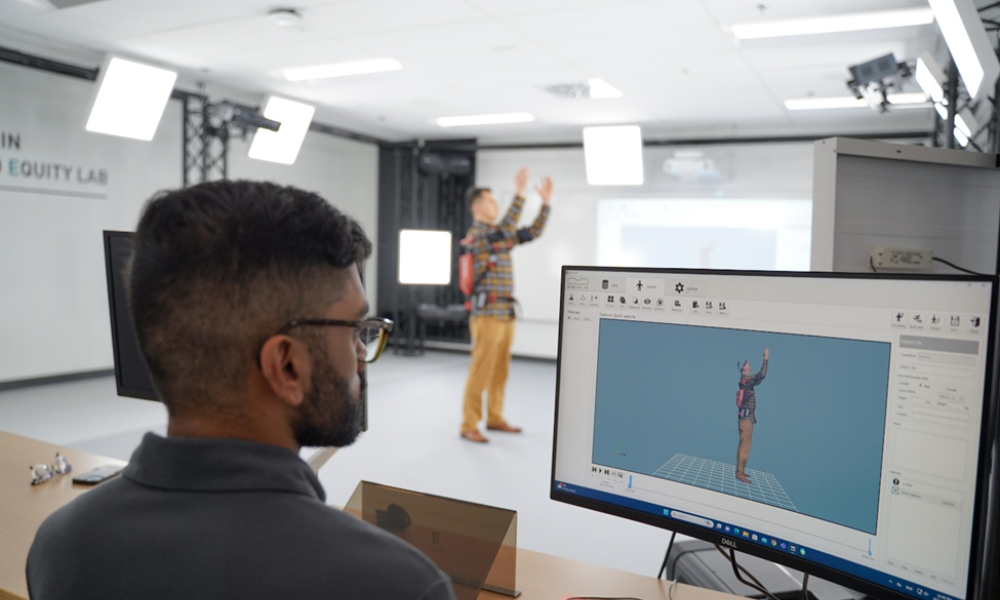Technology is part of two new safety research labs at Conestoga College

Conestoga College is pushing the research envelope in workplace safety with the launch of two state-of-the-art research labs under the Canadian Institute for Safety, Wellness & Performance (CISWP). At the forefront is the STRIDE lab, featuring Canada's first 4D body scanner, a breakthrough technology that is poised to revolutionize the design of personal protective equipment (PPE), particularly for women in the skilled trades.
The 4D body scanner at STRIDE is a unique European technology, allowing researchers to collect precise anthropometric data from Canadian workers. This data includes both static and dynamic measurements, capturing how bodies move in real-world work scenarios. “We are very fortunate to have one of the only 4D body scanner systems in Canada,” says Amin Yazdani, executive director of CISWP. “This technology enables us to scan individuals not just in static postures but also during dynamic movements, which is crucial for designing tools, equipment, and PPE that are truly inclusive and safe for a diverse workforce.”
The STRIDE lab is dedicated to building a comprehensive anthropometric database that reflects the diversity of the Canadian skilled trades workforce. By partnering with industry stakeholders, unions, contractors, and tradespeople, CISWP can recruit a diverse range of participants from across various trades. This collaborative approach ensures the data collected is both representative and comprehensive. “Our focus is on scanning men and women in different trades to create a database that manufacturers can use to design more inclusive tools and equipment,” explains Yazdani. “Currently, PPE and other workplace tools are often designed based on outdated data that does not reflect the diverse body types of today’s workforce.”
Once collected, this data will be made publicly available through two databases that CISWP plans to establish over the next few years. These databases will provide manufacturers with the detailed information needed to design PPE and other workplace tools that are better suited to the diverse Canadian workforce. “The hope is to share this information with manufacturers of tools, equipment, and PPE, to foster more inclusive designs that better protect all workers, especially women,” Yazdani notes. “By providing this data, we aim to reduce barriers to entry into the skilled trades for underrepresented groups and enhance safety for all workers.”
In addition to the STRIDE lab, Conestoga College is also introducing the START lab, which focuses on preventing workplace injuries through advanced research and technology. Equipped with specialized biomechanical, neurocognitive, and physiological instruments, the START lab allows researchers to study various dimensions of human performance to identify and mitigate injury risks.
“Our field equipment enables us to conduct ecologically valid research with actual workers on their worksites as they perform their actual work tasks,” says Marcus Yung, CISWP’s development and operations director. “By combining field research with the control and reliability of lab studies, we can develop targeted, innovative solutions to prevent workplace injuries and disabilities.”
The START lab’s portable measurement equipment and wearable sensors are used in the field to gather data directly from workers as they engage in their daily tasks, providing researchers with a realistic view of job activities and associated risks. This dual approach ensures that the knowledge gained is scientifically rigorous and practically applicable, allowing it to be translated back into real-world settings. “We aim to understand the true exposures and capacities of the workforce by collecting real-world data,” says Yazdani. “This approach allows us to design workplaces, tools, and equipment that prevent injuries and improve productivity.”
CISWP’s new labs at Conestoga College mark a significant advancement in work and health research in Canada. Positioned at the Skilled Trades Campus, the labs have access to over 4,000 apprentices and trainees annually, making them a hub for research with the current and next generation of skilled trade workers. “Our multidisciplinary team is well-equipped to influence change early and broadly, embedding health and safety right into the training of future workers,” Yazdani adds.
The official opening of the STRIDE and START labs will take place during the Skilled Trades Safety Fair on October 15 at Conestoga College’s Skilled Trades Campus in Cambridge. The event will feature lab tours, demonstrations of the new technologies, and networking opportunities with health and safety professionals and industry leaders. “This fair is an excellent opportunity for everyone to see firsthand how we are revolutionizing workplace safety,” Yazdani invites. “We welcome all to come and engage with our team and explore the exciting advancements we are making in this critical field.”





